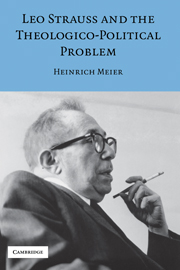Book contents
- Frontmatter
- Contents
- Preface to the American Edition
- I THE THEOLOGICO-POLITICAL PROBLEM: ON THE THEME OF LEO STRAUSS
- 1 The Theologico-Political Problem
- 2 On the Genealogy of Faith in Revelation
- 3 Death as God: A Note on Martin Heidegger
- II THE HISTORY OF PHILOSOPHY AND THE INTENTION OF THE PHILOSOPHER: REFLECTIONS ON LEO STRAUSS
- III WHAT IS POLITICAL THEOLOGY?
- IV WHY POLITICAL PHILOSOPHY?
- APPENDIX: TWO UNPUBLISHED LECTURES BY LEO STRAUSS
- Index of Names
2 - On the Genealogy of Faith in Revelation
Published online by Cambridge University Press: 05 March 2013
- Frontmatter
- Contents
- Preface to the American Edition
- I THE THEOLOGICO-POLITICAL PROBLEM: ON THE THEME OF LEO STRAUSS
- 1 The Theologico-Political Problem
- 2 On the Genealogy of Faith in Revelation
- 3 Death as God: A Note on Martin Heidegger
- II THE HISTORY OF PHILOSOPHY AND THE INTENTION OF THE PHILOSOPHER: REFLECTIONS ON LEO STRAUSS
- III WHAT IS POLITICAL THEOLOGY?
- IV WHY POLITICAL PHILOSOPHY?
- APPENDIX: TWO UNPUBLISHED LECTURES BY LEO STRAUSS
- Index of Names
Summary
In the middle of his philosophical life, at the height of a renewed and deepened confrontation with the theologico-political problem, one conducted more penetratingly than ever before, Strauss sketched a genealogy of faith in revelation. The sketch is unique in his oeuvre. It is part of the fruits of a “shipwreck” as a result of which Strauss saw himself compelled in the summer of 1946 “to begin once more from the beginning.” His renewed reflections found lucid expression in a manuscript that he wrote around the end of 1947 for the lecture “Reason and Revelation” and in notes from the same year on which he drew for the lecture, presented at the Hartford Theological Seminary. The manuscript, insofar as it is completed, culminates in the genealogical sketch. This sketch concludes an astonishingly open dialogue to which Strauss has the lecture lead: In the eighth and final section entitled “Revelation cannot refute philosophy,” in an immediate clash of argument and counterargument, Strauss subjects philosophy to the objections of theology, which he answers for philosophy. Altogether he voices seven theological arguments, whereby arguments 3, 4–5, and 6 are dealt with in an explicit dialogue between “the theologian” and “the philosopher.”
- Type
- Chapter
- Information
- Leo Strauss and the Theologico-Political Problem , pp. 29 - 44Publisher: Cambridge University PressPrint publication year: 2006

